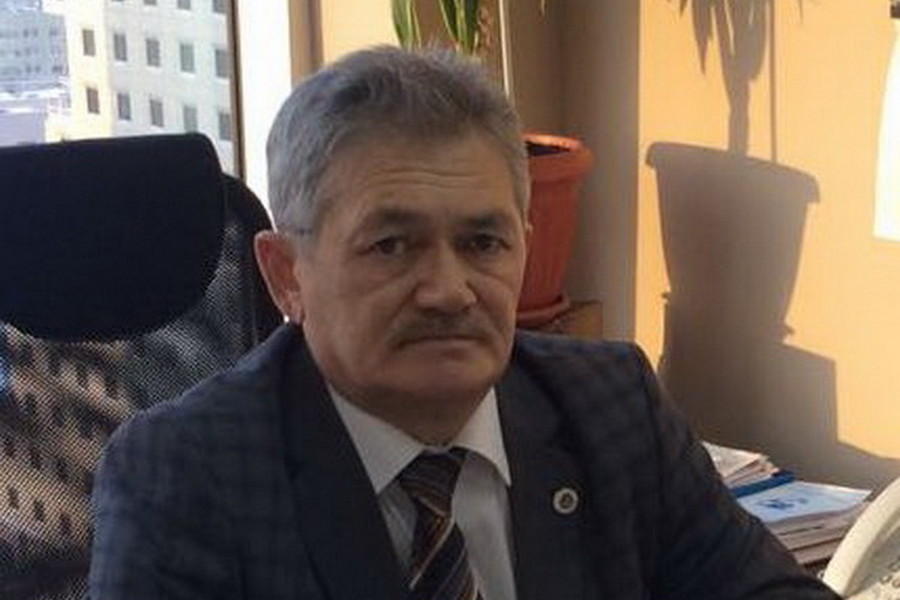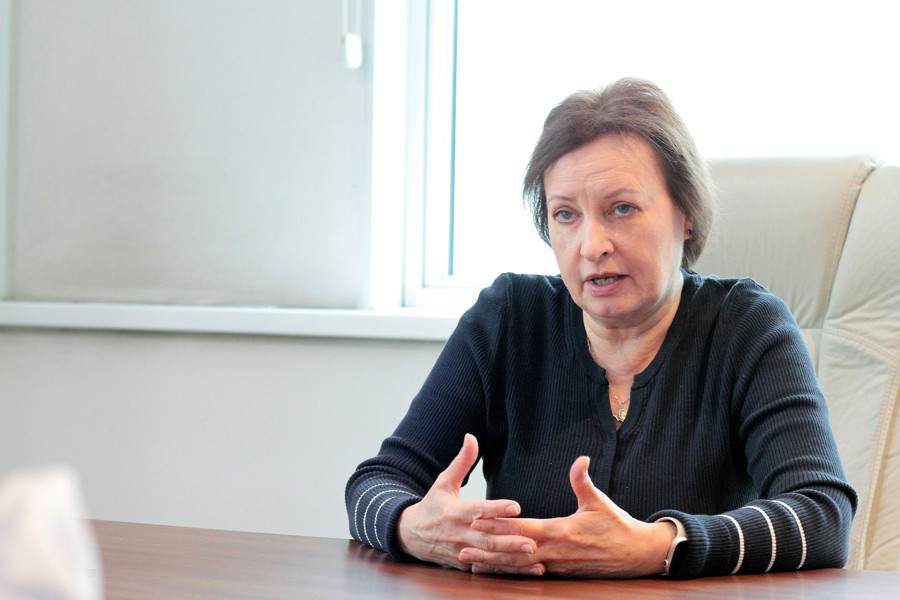Chief Geologist of JSC National Exploration Company KazGeology Berikbol KHAMZIN:
ALL OUR PROJECTS ARE LONG-TERM PROGRAMS THAT WILL YIELD RESULTS IN THE FUTURE

During crisis, it is very important to invest in exploration and to finance projects for analysis of the available geological data, as it will help to discover new ore deposits and, thus, to increase the proven mineral resources of Kazakhstan in the future, said Chief Geologist of JSC National Exploration Company KazGeology Berikbol KHAMZIN told Interfax-Kazakhstan in an interview.
- Could you please tell us about the company’s performance in 2016? What were the results?
- At the end of each year, I usually review the results of the company’s performance. It helps me to get the whole picture of the company’s activities and to see if we were able to achieve the goals and objectives set for the reporting year. This also helps to assess the performance of all company employees. While reviewing this year’s results, I would like to mention a number of projects.
Within the framework of the government’s programs, we conducted seven exploration projects this year.
The company continued the exploration drilling projects with Rio Tino on the Korgantas site in the Karaganda region and with Iluka near the village of Dievka in Kostanai region.
We also continued our cooperation in geological exploration with South Korea’s KORES Corporation on the Dyusembai site near the towns of Zhezkazgan and Satpayev. We also launched a joint exploration project with Japan’s JOGMEC Corporation in the Karaganda region.
This year we put into operation state-of-the-art multi-function self-propelled drilling rigs by Dando Drilling International, UK.
Iluka conducted an airborne geophysical survey project using the Geotech method developed by JV KazGeoTech.
The company conducted negotiations with a great many investment companies and signed agreements and memorandums of cooperation with some of them.
As a result the exploration projects, we discovered six prospective areas with gold, copper and rare metal ores. For instance, we identified occurrence of tungsten ore in the course of Depth Mapping-200 Project in the South Balkhash area and submitted the report to the YuzhKazNedra Department. The quality of the ore is as good as in the Verkhneye Kairakty deposit in central Kazakhstan.
In general, 2016 was not an easy year for KazGeology as the government’s financial support for mineral resources management programs had reduced significantly. Nevertheless, we kept all our projects running and drilled wells totaling about 11,000 meters in length in 2016.
- What do you think Kazakhstan should do to further improve its investment climate?
- Foreign investors are mostly interested, in the first place, in rich mineral resources of Kazakhstan. When coming to the country, the investors consider preferences they may be offered. They also want to know if the national law protects their interests. The president of Kazakhstan set a task to enter the international exploration market and to create favorable conditions for foreign investment. To this end, Kazakhstan is reforming legislation relating to mineral resources management in order to improve the business environment not only for foreign but also for domestic investors. The country is also developing a Subsoil Use Code. These reforms are aimed to ease the issue of exploration licenses, to provide access to reliable geological information, and to reduce administrative barriers.
It is necessary to create tax incentives and other benefits in order to attract investors. Taking into account the fact that geological exploration is associated with significant risks, the requirements coming from investors are also tough. Currently, while competing with 189 countries for foreign investment, Kazakhstan should be able to offer a wide range of incentives and benefits to investors in exploration projects, for instance VAT exemption. Such cooperation with foreign companies and investors will allow us to adopt their best practices and to introduce innovation technologies. Their investment will help to boost exploration activities in our country.
- Did the company succeed in attracting new foreign investors?
- Though we are a young company, we have attracted dozens of large international investors to be involved in about 30 projects in Kazakhstan.
We held fruitful meetings with potential investors and large international companies including Vale, Anglo American, MA’ADEN, NMDC. We also signed a cooperation agreement with Metals Corners Holding Co (MCHC) in Saudi Arabia with investment amounting to 16.5 billion tenge (or $50 million).
In 2016, we also signed a memorandum of understanding with Korea Institute of Geoscience and Mineral Resources (KIGAM) in order to share experiences and to jointly discover promising lithium mineralized zones in Kazakhstan.
The company closed one of the major deals with the Swedish company Glencore with initial investment amounting to $10 million. In 2017, we plan to start work on five prospective zinc and lead deposits in the Akmola, East Kazakhstan and North Kazakhstan regions.
We also partnered with Turkey’s Yildirim, Iran’s Ghadir Industry, Sadr Tamin Co and SUNIR, Russia’s Polymetal JSC and Metals Corners Holding Co from the United Arab Emirates. Total investment is expected to exceed $100 million.
- How do the company and the whole industry operate in the current economic situation?
- In general, the mineral-exploration industry is getting through this difficult time rather easily, as it has received enough financing from the National Fund. Some of our ongoing projects have already produced good results showing real prospects for the discovery of copper, gold and metal ore resources, which are in high demand in the world.
As Kazakhstan does not have a specialized fund to support exploration activities, it is very import for the country, during this crisis, to invest in exploration, to finance projects for analysis of the available geological data and to continue the regional exploration projects that have been underway in the last few years. Such investment would allow Kazakhstan to develop a comprehensive exploration program in order to increase its proven mineral recourses in the future.
- What are the company’s ongoing projects?
- Currently, we are implementing seven projects in central Kazakhstan. All these projects, totaling 2.3 billion tenge in value, are financed from the government budget. We plan to complete the projects in 2017.
To date we have finished field operations in five areas and we are now processing the geological data collected in five areas in central Kazakhstan and analyzing the samples. We will present exploration reports later. We expect positive results for the Saryadyr and Altynshoka areas.
The company also keeps working on investment projects. We are carrying out three projects with Iluka in the North Kazakhstan region and one project with JOGMEC in the Kyzymshek area in the Karaganda region. We will also continue our joint work with the Korean company Kores in the Dyusembai area, which will lead to the assessment of probable reserves and a decision about further work, before the estimation of reserves and feasibility study take place. In addition, we will continue our joint activities with Rio Tino in two areas in the Karaganda region.
Our company is mainly focused on exploration of copper, gold, polymetals and rare earth metals.
- Do you have any future projects?
- In 2017, the company is going to complete seven projects in the framework of the government program, which includes the following areas: Altynshoka, Arshaly, the south wing of the Ituaz deposit, Kengazgan, Saryadyr, Tasty and Kerei-Opar.
All these seven areas are located in central Kazakhstan, which is traditionally rich in mineral resources. These exploration projects are aimed to increase the proven mineral resources in the Zhezkazgan region, which will also contribute to the improvement of the social and economic conditions in the one-company towns.
Another priority direction of the company’s activities in 2017 is to conduct a chalcopyrite ore exploration project in the South Mugodzhar area in the Aktobe region in the framework of the government program. We have already discussed this project with the administration of the Aktobe region. We plan to perform exploration operations in eight areas of the region. In case of positive results, this region of the country will see additional mineral resources for further assessment.
In 2016 we launched a six-year exploration project together with KazChrome Transnational Company in the South Kempirsai area. It is too early to talk about future prospects, as the project only started, but we expect to achieve good results and we hope for further cooperation with Eurasian Group.
- What can you tell about the exploratory laboratory project?
- The main purpose of the project is to reduce the number of samples which we usually send to foreign laboratories for testing, and to introduce the international standards for exploration laboratory tests in Kazakhstan. We plan to build the laboratory in Karaganda. KazGeology will attract a foreign partner to purchase state-of-the-art equipment for the laboratory (about $2 million investment). In other words, the investor that we are going to attract will contribute its intellectual property and KazGeology will provide equipment.
To date, we have held meetings and negotiations with such companies as SGS from Sweden and ALS from Australian, which are the leading laboratories in the world.
Our future laboratory will employ local specialists, who will receive training from international companies.
- Could you tell more about the geology center project? What is its purpose?
- The creation of a geology center in the special economic zone Alatau TechnoPark will take the geology of Kazakhstan to a new level in terms of scientific approaches, technology and innovation. The center will serve as a platform for carrying out such activities as laboratory testing in Kazakhstan, personnel training, laboratory research and other high-accuracy special tests. In the future, the center will house a core store, a geological data library, a museum, etc.
This is a big long-term project, which is now under development. To create the geology center, KazGeology needs to deal with financing issues and to find partners. To this end, we learnt about the best practices of the international laboratories in South Korea, Great Britain, Turkey, France and Germany. We visited the geology centers in Korea (Korea Institute of Geoscience and Mineral Resources) and in Great Britain (the Core Store in the National Geological Repository, the training centers and laboratories of the University of Exeter’s Camborne School of Mines, and the laboratories of the Natural History Museum in London).
I would like to say that the company operates steadily, we can see new opportunities, and we hope that the company and the industry will have an optimistic outlook for the future.
- Thank you for your time!
January, 2017
© 2026 Interfax-Kazakhstan news agency
Copying and use of these materials without reference to the source is prohibited
Archive





